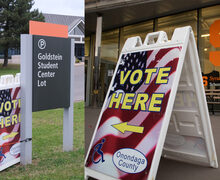Donald Trump plans to cut back visa programs during his first 100 days in office
Moriah Ratner | Staff Photographer
President Donald Trump stopped to campaign in Syracuse, spreading his message that he would "Make America Great Again."
When he announced his plans in November for his first 100 days in the Oval Office, President Donald Trump said he would direct the Department of Labor to “investigate all abuses of visa programs that undercut the American worker.”
A visa is an official government document that authorizes people to be in a country for a specific period of time, for different purposes. Less than a month into his presidency, Trump has already begun to take aim at visa programs and at immigration in general.
Trump’s executive order banning travel from seven Muslim-majority countries affects several visa programs, and Trump’s administration has said it plans to look into reforming the H1-B visa program. H1-B visas are non-immigrant visas that allow employers in the U.S. to temporarily employ highly skilled foreign workers.
Trump on Jan. 30 signed the executive order banning travel from Syria, Iraq, Somalia, Iran, Sudan, Libya and Yemen for 90 days and banning refugees from entering the country for 120 days. Last week, the 9th U.S. Circuit Court of Appeals blocked enforcement of the travel ban, upholding an earlier decision made by a federal judge in Seattle.
If implemented again, though, the ban would affect people who travel to the U.S. on visas, including student visas. At Syracuse University, 50 students were advised not to leave the country after the order was signed because they would not be allowed to return.
The ban also affects people who come to the U.S. on immigrant visas, according to The New York Times. Immigrant visas allow for permanent residence upon arrival to the country.
Trump might also take further aim at other visa programs. Last week, White House Press Secretary Sean Spicer said during a press briefing that Trump would consider reforming the H-1B visa program and other visa programs as part of his immigration reform plan. Spicer said Trump would do that through both executive orders and working with Congress, according to CNN.
The H-1B visa allows foreign workers to gain employment at companies in the U.S. It is often used in STEM fields, and particularly among tech companies.
There is a cap of 85,000 H-1B visas issued each year. The visas are awarded through a lottery system, which has become especially competitive. In 2016, the demand for the visas was three times more than the cap, according to CNN.
Trump has already drafted an executive order that seeks to overhaul the work-visa programs, according to Bloomberg.
“Our country’s immigration policies should be designed and implemented to serve, first and foremost, the U.S. national interest,” the draft proposal states, according Bloomberg, which obtained and reviewed a copy of the order. “Visa programs for foreign workers … should be administered in a manner that protects the civil rights of American workers and current lawful residents, and that prioritizes the protection of American workers.”
While campaigning during the 2016 presidential election, Trump seemed to change his stance on H-1B visas.
During an Oct. 28, 2015, Republican primary debate, Trump said he was “all in favor” of keeping people in the U.S. who are on temporary visas and working at tech companies, according to The Washington Post.
“You can call it visas, you can call it work permits, you can call it anything you want,” he said, per the Post. “… As far as the visas are concerned, if we need people, it’s fine.”
But in a statement on March 3, 2016, Trump said he was “totally committed to eliminating rampant, widespread H-1B abuse.”
“I will end forever the use of the H-1B as a cheap labor program, and institute an absolute requirement to hire American workers for every visa and immigration program,” he said. “No exceptions.”
Published on February 13, 2017 at 10:03 pm
Contact Michael: mdburk01@syr.edu





